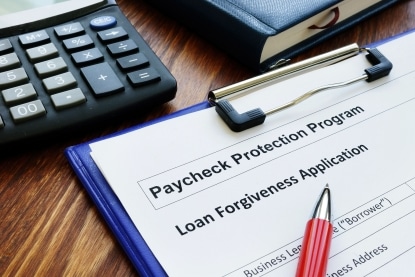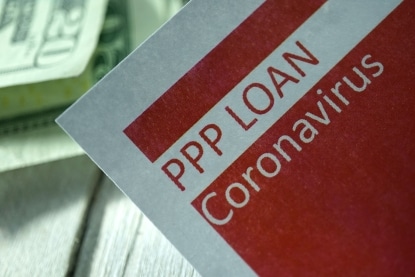PPP Loan Fraud Lawyers in Ohio
The coronavirus pandemic (COVID-19) has forced many businesses to dramatically shift the way they operate. In response to the outbreak, companies in Ohio have had to shut down or lay off employees. Funds have been cut and the demand for financial assistance continues to remain high.
 To help companies face such an unprecedented economic disruption, the Small Business Administration (SBA) created the Paycheck Protection Program (PPP). The program is dedicated to helping small businesses remain operational during the pandemic through loans. Those interested are not required to apply with any specific lender but are able to apply with their current bank or the SBA.com loan request service.
To help companies face such an unprecedented economic disruption, the Small Business Administration (SBA) created the Paycheck Protection Program (PPP). The program is dedicated to helping small businesses remain operational during the pandemic through loans. Those interested are not required to apply with any specific lender but are able to apply with their current bank or the SBA.com loan request service.
While many businesses in the Ohio area have been able to obtain loans through the Paycheck Protection Program (PPP), some are now being investigated for PPP loan fraud. If you are currently being investigated for any crime related to PPP fraud, contact an experienced criminal defense attorney at Joslyn Law Firm before taking any other action – please call us at (614) 444-1900 or contact us online.
PPP Loan Fraud Attorney in Columbus, Ohio
Are you currently facing PPP loan fraud charges in Ohio? In these uncertain times, it’s important to have an experienced PPP loan fraud attorney right by your side. Joslyn Law Firm knows what to expect and what to do to get the best outcome possible. Our PPP fraud lawyers are ready to help educate you about your circumstances.
Our criminal defense attorneys are committed to helping small businesses navigate this crisis and defend their reputations. Set up your first consultation with Joslyn Law Firm by calling (614) 444-1900 or emailing us. Attorney Brian Joslyn and his legal representatives accept cases all throughout Columbus, Ohio including Franklin County, Delaware County, Fairfield County, and Licking County.
Information About PPP Fraud
- What is the Paycheck Protection Program? Who Qualifies?
- Understanding the Use of PPP Loan Proceeds
- Types of PPP Loan Fraud & Penalties
- Additional Resources
What is the Paycheck Protection Program? Who Qualifies?
The Paycheck Protection Program (PPP) was established by the Coronavirus Aid, Relief, and Economic Security Act (CARES act) and signed into law on March 27, 2020. It was created to help small businesses keep their employees on payroll during the coronavirus pandemic. The program, operated through the Small Business Administration (SBA), also provides organizations with forgivable loans that can be utilized to pay interest on mortgages, rent, and utilities.
The following entities may qualify:
-
- Sole proprietors, self-employed individuals, and independent contractors
- Any small business concern that meets SBA’s size standards (either the industry size standard or the alternative size standard)
- Any business, 501(c)(3) non-profit organization, 501(c)(19) veterans organization, or tribal business concern (sec. 31(b)(2)(C) of the Small Business Act) with the greater of:
- 500 employees, or that meets the SBA industry size standard if more than 500
- Any business with a NAICS code that begins with 72 (Accommodations and Food Services). The company should have more than one physical location and employ less than 500 per location
Understanding the Use of PPP Loan Proceeds
Many companies that find themselves being investigated for PPP Loan Fraud may have possibly misunderstood what costs count as payroll or what PPP funds can be used for prior to submitting an application. PPP loan proceeds may be used for a variety of expenses.
Under the Paycheck Protection Program (PPP), payroll costs include:
- Compensation: salary, wages, commissions, and similar below $100,000
- Parental, family, medical, and sick leave
- Employee Vacation
- Payment required for the provisions of group health care benefits, including insurance premiums
- Allowance for separation or dismissal
- Payment of any retirement benefit
- Payment of state or local tax assessed on the compensation of employees
- Group health care benefits including insurance premiums
PPP Funds can be used for:
- Payroll costs (as listed above)
- Salaries and commissions that are excluded from Payroll Costs (e.g., compensation in excess of $100,000).
- Rent (including rent under a lease agreement)
- Utilities (electricity, gas, water, transportation, telephone and internet access)
- Interest payments on any mortgage obligation
Types of PPP Loan Fraud & Penalties

- Wire Fraud (18 U.S.C. Section 1343): This occurs when an individual obtains money or property by means of false pretenses, representations, promises via wire, radio, television. Under Section 1343, “such person shall be fined not more than $1,000,000 or imprisoned not more than 30 years, or both.”
- Bank Fraud (18 U.S.C. Section 1344): Small businesses that submitted fraudulent PPP loans applications can also face bank fraud charges under 18 U.S.C. Section 1344. This particular fraud involves submitting false or forged documentation to a financial institution. Penalties are similar to those of wire fraud. Whoever knowingly executes a plan to defraud a bank “shall be fined not more than $1,000,000 or imprisoned not more than 30 years, or both.”
- Aggravated Identity Theft (18 U.S.C. § 1028A): Identity Theft involves unlawfully utilizing another individual’s or company’s information in furtherance of a crime. Companies that submitted a PPP loan application with a distinct identity could be charged with identity theft. In addition to the penalties for bank fraud, which is considered the underlying offense, this crime includes a minimum mandatory prison sentence of 2 years.
Additional Resources

SBA Paycheck Protection Program – Visit the official Small Business Administration (SBA) website to learn more about the Paycheck Protection Program. You will find information on how to apply for the PPP, program changes, and more.
18 U.S. Code Chapter 63 – 18 U.S. Code Chapter 63 lists statutes regarding mail fraud, health care fraud and other fraud offenses. You can find definitions of specific terms and explanations of how value is calculated in these cases. Visit the website to learn more.
Paycheck Protection Program (PPP) Loan Fraud Lawyer in Columbus, OH
If your business is facing federal investigation or charges for PPP Fraud, our defense attorneys at Joslyn Law Firm are ready to fight on your behalf. The crimes associated with PPP loan fraud have serious consequences and your liberty could be at stake. Joslyn Law Firm has a proven track record of success in handling over 15,000 criminal cases and can help you find the best possible outcome for your situation.
Ohio White Collar Crime Attorney Brian Joslyn and his team represent clients in Franklin, Fairfield, Delaware, Madison, Licking, Pickaway, and Union County. Please call us at (614) 444-1900 or contact us online for a free consultation or to set up an appointment to visit one of our Ohio offices.
Additional Criminal Fraud Defense
We also provide defense lawyers for these other types of fraud in Columbus and central Ohio:















